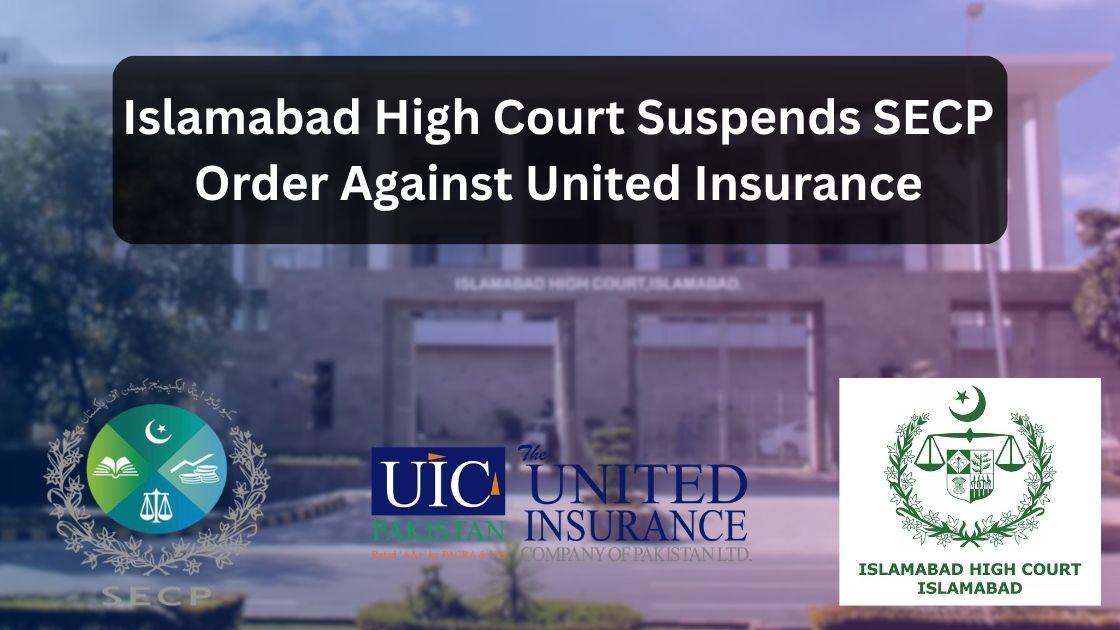Islamabad High Court Suspends SECP Order against United Insurance

In a significant development for Pakistan’s insurance sector, the Islamabad High Court (IHC) has suspended a controversial order issued by the Securities and Exchange Commission of Pakistan (SECP) against the United Insurance Company (UIC). The court’s decision grants interim relief to UIC, allowing it to resume its guarantee business operations while the matter undergoes further legal review.
Background of the Dispute
The case dates back to May 20, 2025, when the SECP invoked Section 60 of the Insurance Ordinance, 2000, to prohibit UIC from issuing guarantee products. The regulatory action was based on claims that UIC had repeatedly failed to honour its insurance guarantees—a serious allegation that questioned the company’s regulatory compliance and operational integrity.
What followed was a media storm that dealt a severe blow to UIC’s reputation and financial standing. As the SECP’s order was widely circulated through media outlets, critics argued that the public nature of the announcement intensified the damage, eroding client confidence and unsettling the market.
UIC’s Legal Challenge
In response, UIC initially appealed to the SECP’s Appellate Bench. However, the bench upheld the original decision of the Insurance Division. With no further administrative recourse, UIC filed a writ petition in the Islamabad High Court, challenging the order as unlawful, arbitrary, and based on an unverified complaint.
Represented by Advocate Ahmad Hassan, UIC argued that the regulator had bypassed due process and violated fundamental legal principles. The IHC appeared to agree—at least on a preliminary basis—and suspended the SECP’s order while instructing the regulatory body to submit a detailed response within two weeks.
A Matter of Natural Justice
The IHC’s remarks were pointed and instructive. The court noted that the SECP's actions seemed to violate the principles of natural justice and emphasized that regulators must not harass stakeholders under vague or unsubstantiated pretexts. This statement underscores a growing concern within Pakistan’s corporate sector: the need for regulatory actions to be grounded in fairness, transparency, and procedural due diligence.
A Broader Industry Perspective
This case has sparked a larger debate on the role and responsibilities of regulatory bodies in Pakistan. Legal and business experts are now urging authorities to exercise their powers with greater accountability. While regulatory oversight is essential for maintaining market integrity, abrupt and unilateral decisions—especially when broadcasted publicly—can have far-reaching consequences.
Such actions can erode investor trust, destabilize market conditions, and threaten employment in key sectors. In a fragile economy like Pakistan’s, the ripple effects can be particularly damaging, impacting not just one company but the entire business ecosystem.
Industry’s Response and UIC’s Standing
Industry stakeholders have voiced concern over what they describe as a “media trial” of a major corporation. “Regulators should refrain from damaging the reputations of companies that contribute significantly to national development and employment,” said one senior executive.
UIC, with its AA+ credit rating and a track record spanning over two decades, is widely recognized as a pillar of Pakistan’s insurance landscape. The company is the largest employer in the insurance industry and reported Rs. 13 billion in gross written premiums in 2024, along with Rs. 4.5 billion in claim disbursements. It consistently ranks among the top five insurers in the country.
A Litmus Test for Institutional Balance
Observers now see the IHC’s decision as more than just a corporate victory—it’s a test of institutional balance between governance and commercial rights. Regulatory bodies must be empowered, but their actions should be transparent, proportionate, and subject to checks and balances.
As this case unfolds, it will likely set a precedent for how regulatory decisions are contested and reviewed in the future. For Pakistan to attract and retain investment—both domestic and foreign—it must ensure that its regulatory framework does not become a source of unpredictability or unjust disruption.
Conclusion
The suspension of the SECP’s order against United Insurance by the Islamabad High Court is a pivotal moment for Pakistan’s corporate and regulatory landscape. It highlights the need for balanced governance that respects both legal safeguards and the economic contributions of major industry players. As the case proceeds, all eyes will be on how the judiciary, regulators, and the private sector shape the evolving contours of corporate accountability in Pakistan.
- Art
- Causes
- Crafts
- Dance
- Drinks
- Film
- Fitness
- Food
- Spellen
- Gardening
- Health
- Home
- Literature
- Music
- Networking
- Other
- Party
- Religion
- Shopping
- Sports
- Theater
- Wellness
- Script
- App
